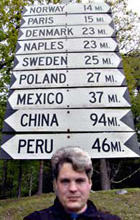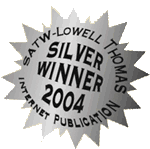Subscribe to the blog 
|
 |
 |
 |
 |
 |
Find a Flight Consider a Consolidator Rent a Car Pick a Railpass Book a Vacation Reserve a Room Get Gear |
|
||||||
|
Money
& Shopping
One of the hardest things to get used to in England, especially if you have traveled elsewhere, is doing the quick conversion of pounds to dollars in your head because a single pound is actually worth more than a single dollar, a rather unusual situation—though these days, with the Euro worth more than the dollar as well, this rule is changing. I'm not talking about exchange rates and relative strengths of different currencies. I'm talking about the actual numerals on the price tag. In most other countries (outside of the Euro zone, that is) when you look at a price sticker you can pretty much be sure that, if you knock off all those zeros at the end, the number left over in the price is going to be a bit more than its dollar equivalent, so you can go ahead and buy the thing—what a bargain! In this way, you know that eight Swiss francs are worth seven US dollars, 1,000 Yen are really only about ten bucks, and eight zillion pesos is pocket change. But in England, your brain will often refer almost automatically to this general rule, and you'll find yourself buying a $95 pair of shoes that, at 50£, seemed like about a $30 bargain. Follow all that? Neither did I. Economics is not my strong suit, which is why I get tripped up in England when I shop around for the best exchange rates posted outside banks and exchange booths. I am so used to looking for the rate with the highest numbers (that being a good thing in other countries), that I always go around London for the first few days actively hunting for what turns out to be the worst rate I can find. In my confusion, I also do stupid things like making the obvious mistake of patronizing the currency exchange booths located right there next to the gift shops at Important Historic Monuments. These are the kind of shrewd financial decisions that warn truly intelligent people against letting a moron like me get a hold of any money, as I would be more apt than not to blow my nose with it or make a nice origami shape, or possibly confetti. Oh, by the way. The Scots have their own money, which goes by the same names and units (Scottish Pounds), but is worth a bit less than the British Pound Sterling. One other beef: Pound notes are too big, like those giant sheets of paper you see them using in old movies where everything seems to cost between 15¢ and $1.50, including a ranch. By "too big," I mean that pound notes don't fit into a "regular" size wallet properly. In order to get them to fit, you have to fold them in half, and then fold that over again into a quarter and then shove this thick roll into your wallet sideways. This means you have to take the whole wad out to get to the inside bills, plus it makes it awful darn uncomfortable to sit down.
Fiver - A five pound note. "'Give me a pint' growled Percy as he slapped a crumpled fiver down on the damp bar. The bartender put down the glass he was wiping out with a dirty grey rag, and nodded his chin up at Percy. 'You got a lot of nerve showing your face in here, squire.'" is not the sort of opening you will find in any British novel. Quid - A nickname for a pound (the money, not the weight). Before you go getting upset with the Brits having two names for some of their units of currency, remember that we do the same thing for practically all of ours. Most countries would be perfectly content to call their change units one cent, five cents, ten cents, 25 cents, one dollar, etc.. But we have to go and mess things up with words like penny, nickel, dime, quarter, buck, etc.... Just be thankful that in England, as in America, a penny can't buy anything anymore, otherwise we'd probably still have to deal with "ha'pennies" and "tuppance." Pee (p.) - Short for pence. "That'll be two quid twenty pee, please," means two pounds and 20 pence. I refuse to make any jokes about the spelling of this abbreviation. "Spend a Penny" - To go pee (get it, "pee," as in BritSpeak for penny). This old-fashioned euphemism for going to the bathroom is primarily used by woman, sort fo the equivalent to our going to "powder one's nose." While this idiom strictly has nothing to do with money (other than the fact that in Europe you will run into more bathroom attendants who expect to be tipped than you will in America), it does have "penny" in the phrase, plus I have a weakness for juxtaposition. more >> getting
about | food | pubs
& drinking | money & shopping |

